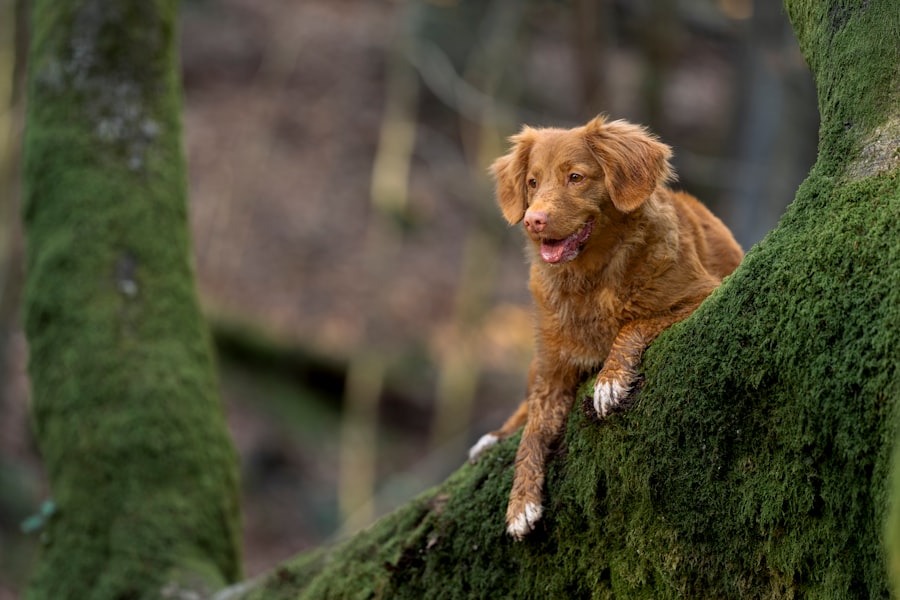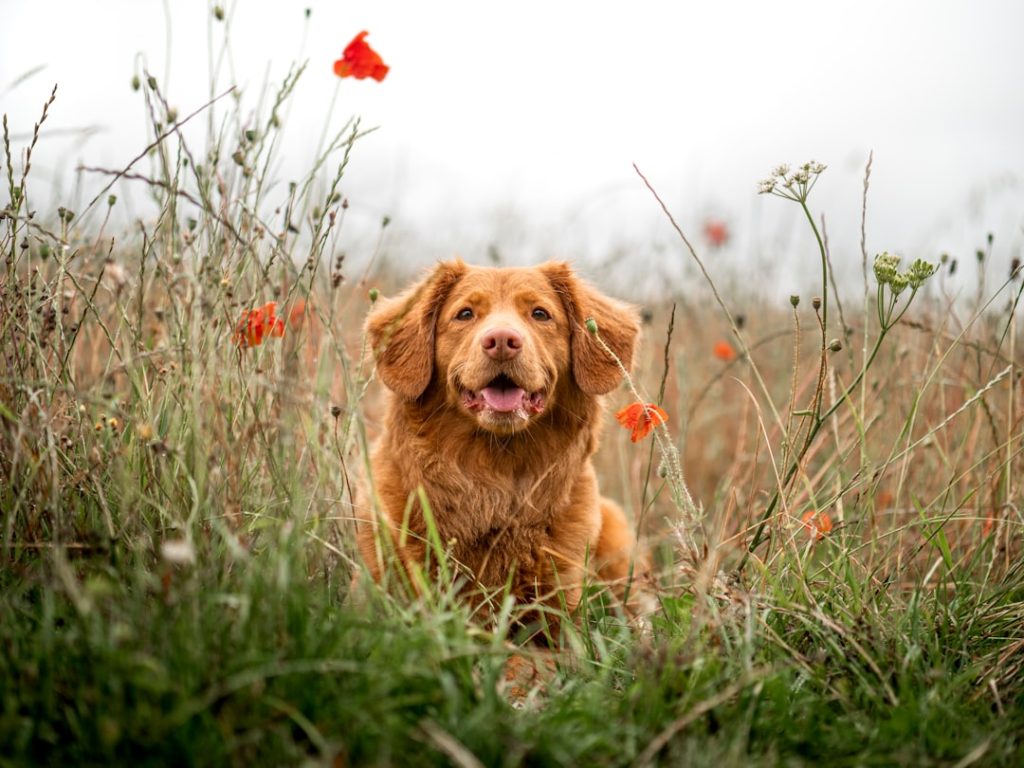The Nova Scotia Duck Tolling Retriever, also known as the Toller, is a medium-sized breed that originated in the early 19th century in the Little River District of Yarmouth County, Nova Scotia, Canada. The breed was developed to toll, lure, and retrieve waterfowl. Tolling refers to the dog’s ability to play and frolic along the shoreline, attracting the curiosity of ducks and geese, thus luring them within gunshot range for hunters. The Toller is the smallest of the retriever breeds and is known for its distinctive red coat and white markings.
The breed’s exact origins are not well-documented, but it is believed that the Toller is a mix of various breeds, including the Chesapeake Bay Retriever, Cocker Spaniel, and possibly some farm collie or Irish Setter. The breed was officially recognized by the Canadian Kennel Club in 1945 and by the American Kennel Club in 2003. Today, the Nova Scotia Duck Tolling Retriever is known for its intelligence, agility, and playful nature, making it an excellent hunting companion and family pet.
The Toller’s history is deeply rooted in its working abilities, and it has been used for hunting and retrieving waterfowl for centuries. The breed’s name “tolling” comes from the Middle English word “tollen,” which means to lure or entice. Tollers were originally bred to work alongside hunters, using their playful antics to attract waterfowl within range. Over time, Tollers have also become popular as family pets due to their friendly and affectionate nature. Their history as a working breed has shaped their temperament and instincts, making them excellent companions for outdoor activities and sports such as agility and flyball.
Table of Contents
- 1 Finding a Reputable Breeder in Massachusetts
- 2 Health and Genetic Testing for Nova Scotia Duck Tolling Retrievers
- 3 The Importance of Socialization and Training for NSDTRs
- 4 Choosing the Right Puppy for Your Family
- 5 The Responsibilities of Owning a Nova Scotia Duck Tolling Retriever
- 6 Resources for Nova Scotia Duck Tolling Retriever Owners in Massachusetts
- 7 FAQs
- 7.1 What is a Nova Scotia Duck Tolling Retriever?
- 7.2 What should I look for in a Nova Scotia Duck Tolling Retriever breeder in Massachusetts?
- 7.3 How can I find a Nova Scotia Duck Tolling Retriever breeder in Massachusetts?
- 7.4 What health considerations should I be aware of when getting a Nova Scotia Duck Tolling Retriever?
- 7.5 What should I expect when getting a Nova Scotia Duck Tolling Retriever from a breeder in Massachusetts?
Key Takeaways
- The Nova Scotia Duck Tolling Retriever originated in the early 19th century in Nova Scotia, Canada, where they were bred to lure and retrieve waterfowl.
- When looking for a reputable breeder in Massachusetts, it’s important to do thorough research, ask for references, and visit the breeder’s facilities to ensure the health and well-being of the dogs.
- Health and genetic testing for Nova Scotia Duck Tolling Retrievers should include hip and elbow evaluations, eye examinations, and genetic testing for conditions such as progressive retinal atrophy and collie eye anomaly.
- Socialization and training are crucial for NSDTRs to ensure they develop into well-behaved and well-adjusted dogs, as they are intelligent and energetic breeds.
- When choosing the right puppy for your family, consider the puppy’s temperament, energy level, and compatibility with your lifestyle and household dynamics.
- Owning a Nova Scotia Duck Tolling Retriever comes with responsibilities such as providing proper exercise, mental stimulation, grooming, and healthcare to ensure their well-being.
- Resources for Nova Scotia Duck Tolling Retriever owners in Massachusetts include local breed clubs, training facilities, veterinarians, and online communities for support and information sharing.
Finding a Reputable Breeder in Massachusetts
When looking for a reputable Nova Scotia Duck Tolling Retriever breeder in Massachusetts, it’s essential to do thorough research to ensure that you are getting a healthy and well-socialized puppy. Start by reaching out to local breed clubs and organizations such as the Nova Scotia Duck Tolling Retriever Club (USA) or the American Kennel Club (AKC) for breeder referrals. These organizations can provide you with a list of breeders who adhere to their breeding standards and ethics.
Once you have a list of potential breeders, take the time to visit their facilities and meet their dogs in person. A reputable breeder will be transparent about their breeding practices, health testing protocols, and the living conditions of their dogs. They should also be willing to provide you with references from previous puppy buyers. Additionally, ask about the breeder’s involvement in dog shows, performance events, or other activities that demonstrate their commitment to the breed.
It’s also important to inquire about health clearances for genetic conditions such as hip dysplasia, progressive retinal atrophy (PRA), and autoimmune thyroiditis. Responsible breeders will conduct these tests on their breeding dogs to ensure that they are not passing on hereditary health issues to their offspring. By doing your due diligence and asking the right questions, you can find a reputable Nova Scotia Duck Tolling Retriever breeder in Massachusetts who prioritizes the health and well-being of their dogs.
Health and Genetic Testing for Nova Scotia Duck Tolling Retrievers
Health and genetic testing are crucial aspects of responsible breeding for Nova Scotia Duck Tolling Retrievers. Like all purebred dogs, Tollers are prone to certain genetic conditions that can be passed down from one generation to the next. To ensure the long-term health and well-being of the breed, it is essential for breeders to conduct health screenings on their breeding dogs before producing litters.
Some of the most common health concerns in Nova Scotia Duck Tolling Retrievers include hip dysplasia, progressive retinal atrophy (PRA), autoimmune thyroiditis, and Collie Eye Anomaly (CEA). Hip dysplasia is a hereditary condition that affects the hip joints, leading to pain and mobility issues. PRA is a degenerative eye disease that can lead to blindness. Autoimmune thyroiditis is an autoimmune disorder that affects the thyroid gland, leading to hormonal imbalances. CEA is an inherited eye condition that can cause vision impairment.
Responsible breeders will conduct health screenings for these conditions and others as recommended by the National Breed Club and veterinary professionals. These screenings may include hip evaluations, eye examinations, thyroid testing, and DNA testing for genetic markers associated with specific conditions. By prioritizing health and genetic testing, breeders can reduce the incidence of hereditary diseases in Nova Scotia Duck Tolling Retrievers and produce healthier puppies for future generations.
Socialization and training are essential components of raising a well-behaved and well-adjusted Nova Scotia Duck Tolling Retriever. Early socialization helps puppies develop positive associations with people, animals, and new environments, which can prevent fearfulness and aggression later in life. It’s important to expose Toller puppies to a variety of sights, sounds, smells, and experiences during their critical socialization period, which typically occurs between 3 and 14 weeks of age.
Proper training is also crucial for NSDTRs due to their high intelligence and energetic nature. Positive reinforcement methods such as praise, treats, and play are effective for teaching obedience commands, house manners, and good behavior. Toller puppies respond well to training that is fun, engaging, and mentally stimulating. They excel in activities such as agility, obedience, rally, and retrieving games.
Consistent training and socialization are essential for preventing behavioral issues such as separation anxiety, excessive barking, destructive chewing, and leash pulling. It’s important for Toller owners to invest time and effort into training their dogs from an early age to establish good habits and prevent problem behaviors from developing. With proper socialization and training, Nova Scotia Duck Tolling Retrievers can grow into well-mannered and confident companions for their families.
Choosing the Right Puppy for Your Family
When choosing a Nova Scotia Duck Tolling Retriever puppy for your family, it’s important to consider your lifestyle, activity level, and experience with dog ownership. Tollers are active, intelligent, and energetic dogs that require plenty of mental stimulation and physical exercise. They thrive in homes where they can participate in outdoor activities such as hiking, running, swimming, and retrieving games.
It’s also important to consider the age of your children and any other pets in the household when selecting a Toller puppy. Nova Scotia Duck Tolling Retrievers are known for their friendly and affectionate nature, but they may be too exuberant for very young children or small animals if not properly supervised. Additionally, Tollers require consistent training and socialization from an early age to ensure that they grow into well-behaved family members.
When meeting potential Toller puppies, observe their behavior and temperament to see if they are a good match for your family dynamics. Look for puppies that are curious, confident, and eager to interact with people. It’s also important to ask the breeder about the puppy’s personality traits and any specific considerations for their care and training. By taking these factors into account, you can choose a Nova Scotia Duck Tolling Retriever puppy that will thrive in your family environment.
The Responsibilities of Owning a Nova Scotia Duck Tolling Retriever

Owning a Nova Scotia Duck Tolling Retriever comes with several responsibilities that should be carefully considered before bringing a Toller into your home. First and foremost, Tollers require regular exercise to maintain their physical health and mental well-being. Daily walks, playtime, and interactive activities are essential for keeping them happy and content. Without enough exercise, Tollers may become bored or restless, leading to undesirable behaviors such as excessive barking or chewing.
In addition to exercise, NSDTRs require consistent training and mental stimulation to keep their active minds engaged. They excel in activities such as obedience training, agility courses, retrieving games, and interactive toys that challenge their problem-solving abilities. Toller owners should be prepared to invest time and effort into training their dogs from an early age to establish good habits and prevent behavioral issues.
Another responsibility of owning a Nova Scotia Duck Tolling Retriever is providing proper healthcare, including regular veterinary check-ups, vaccinations, parasite prevention, and dental care. Additionally, Toller owners should be prepared for grooming maintenance such as brushing their double coat regularly to prevent matting and shedding. By understanding the responsibilities of owning a Toller and being prepared to meet their needs, you can provide a happy and fulfilling life for your furry companion.
Resources for Nova Scotia Duck Tolling Retriever Owners in Massachusetts
As a Nova Scotia Duck Tolling Retriever owner in Massachusetts, there are several resources available to help you care for your Toller and connect with other enthusiasts of the breed. The Nova Scotia Duck Tolling Retriever Club (USA) is a valuable resource for breed information, events, health resources, breeder referrals, and networking with other Toller owners in your area. The club hosts regional specialties, performance events, educational seminars, and social gatherings for members to learn more about the breed and connect with fellow enthusiasts.
Additionally, local dog training facilities in Massachusetts offer obedience classes, agility courses, rally trials, and other activities that are suitable for Nova Scotia Duck Tolling Retrievers. These programs provide opportunities for socialization, mental stimulation, and skill development for Toller owners who want to engage in activities with their dogs.
Furthermore, online forums and social media groups dedicated to Nova Scotia Duck Tolling Retrievers can be valuable sources of information and support for Toller owners in Massachusetts. These platforms allow owners to ask questions, share experiences, seek advice on training or behavior issues, and connect with others who have a passion for the breed.
By taking advantage of these resources, Nova Scotia Duck Tolling Retriever owners in Massachusetts can access valuable support networks and educational opportunities to enhance their experience with this unique and versatile breed.
If you’re a Nova Scotia Duck Tolling Retriever breeder in Massachusetts, you understand the importance of providing a safe and comfortable environment for your dogs. Just like with poultry, ensuring the right conditions is crucial for their well-being. In fact, Poultry Wizard has a helpful article on choosing the right heater for a chicken coop, which can also be beneficial for dog breeders looking to maintain optimal conditions for their animals. Check out the article here to learn more about creating a cozy and safe space for your beloved retrievers.
FAQs
What is a Nova Scotia Duck Tolling Retriever?
The Nova Scotia Duck Tolling Retriever, also known as the Toller, is a medium-sized breed of gundog known for its distinctive red coat and playful nature. They were originally bred in the early 19th century in the Little River District of Nova Scotia, Canada, to lure and retrieve waterfowl.
What should I look for in a Nova Scotia Duck Tolling Retriever breeder in Massachusetts?
When looking for a Nova Scotia Duck Tolling Retriever breeder in Massachusetts, it’s important to find a reputable breeder who prioritizes the health and well-being of their dogs. Look for breeders who are registered with the American Kennel Club (AKC) and who can provide health clearances for their breeding dogs.
How can I find a Nova Scotia Duck Tolling Retriever breeder in Massachusetts?
You can find Nova Scotia Duck Tolling Retriever breeders in Massachusetts by searching online for breeders in the area, contacting local dog clubs or breed-specific organizations, and asking for recommendations from other Toller owners or enthusiasts.
What health considerations should I be aware of when getting a Nova Scotia Duck Tolling Retriever?
Like all breeds, Nova Scotia Duck Tolling Retrievers are prone to certain health issues, including hip dysplasia, progressive retinal atrophy, and autoimmune disorders. It’s important to work with a responsible breeder who conducts health screenings on their breeding dogs to minimize the risk of these conditions.
What should I expect when getting a Nova Scotia Duck Tolling Retriever from a breeder in Massachusetts?
When getting a Nova Scotia Duck Tolling Retriever from a breeder in Massachusetts, you should expect to receive documentation of the dog’s health clearances, information about the dog’s lineage and pedigree, and guidance on caring for and training your new Toller. Good breeders will also be available for support and advice throughout the dog’s life.
Meet Walter, the feathered-friend fanatic of Florida! Nestled in the sunshine state, Walter struts through life with his feathered companions, clucking his way to happiness. With a coop that’s fancier than a five-star hotel, he’s the Don Juan of the chicken world. When he’s not teaching his hens to do the cha-cha, you’ll find him in a heated debate with his prized rooster, Sir Clucks-a-Lot. Walter’s poultry passion is no yolk; he’s the sunny-side-up guy you never knew you needed in your flock of friends!







